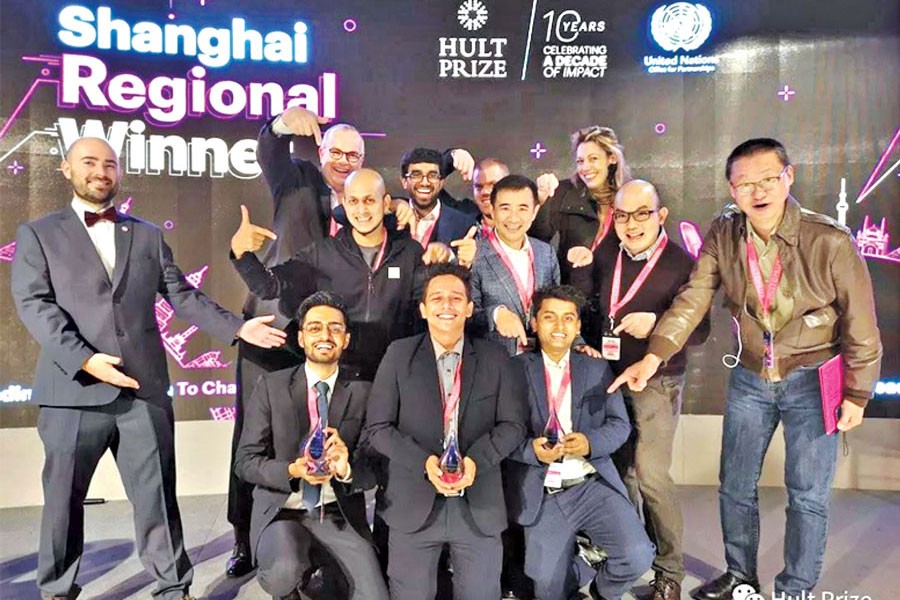Hult Prize is to generate startup ideas by young people to sustainably solve the world's most critical social challenges. It is not only a business competition but also a platform to raise fund for the startups of the young generation, mainly students. This year, Team Blue Ribbon from Bangladesh University of Professionals (BUP), the winner of Hult Prize Regional Summit, got the opportunity to represent Bangladesh in front of the top Asian business experts in Shanghai, China. The prestigious summit was organised by Hult Prize Foundation, which is the world's biggest engine for the launch of for-good, for-profit startups emerging from universities.
This year there were more than 50 teams from 33 countries. Young entrepreneurs were selected through a process. At first, they had to pitch their idea in their own country, and then they pitched it in the regional summit. Every idea was unique and beneficial for humankind. The grand finale of Hult Prize Regional Summit took place on March 23 in Shanghai. Team Blue Ribbon from Bangladesh, comprising Rafiq Islam, Mazbahul Islam, and Faysal Islam became the winners. They will represent Bangladesh in the global stage in London.
Sayeedur Rahman interviewed the members of Bangladesh team to know their experience of the competition and plans for the upcoming global round.
Question (Q): Can you briefly discuss your idea in the final round of the regional contest? How do you think your idea will affect the relevant stakeholders?
Rafiq: Thousands of rural people in Bangladesh are suffering and at times dying since there is a limited number of ambulances available for the village population. We plan to provide affordable ambulance services to the rural people in Bangladesh. We need support from the government and private sector to provide this service and to save thousands of lives collectively.
Q: How was the regional round different from that of the divisional round in Bangladesh?
Faysal: Before the regional round, we had to compete on campus. At first, Hult Prize Foundation organised the on-campus event. We became champion in our campus round at Bangladesh University of Professionals and was fast-tracked to Shanghai Regional Round. Our campus round was organised by Hult campus Ambassador of BUP, Mukit Morshed. The judges gave us feedback on how we could improve the overall idea.
In Shanghai, all the teams were well prepared. Therefore, it was tough for us to compete against them.
Q: Can you share the experience of the grand finale of the regional round?
Faysal: It was a fantastic night. Fortunately, our presentation was excellent, according to the judges. We received applause and appreciation from the crowd following our presentation. Everyone was amazed by the idea of our project 'Safe Wheel'. The judges felt that the idea is feasible and it can save many lives.
Rafiq: Before the announcement of the result, we went downstairs from the auditorium. We were chatting with some of our friends from Nepal, and then a person ran towards us. He was shouting saying our names and told us that everyone upstairs were waiting for us. We ran with him upstairs, and after reaching the stage, our team name was announced as champion. More than 50 teams from 33 countries around the world participated in the competition. Everybody was cheering and clapping. We felt it was as if our university campus and our juniors and friends were celebrating our winning. We loved the crowd.
Q: What are the challenges, you all as a team faced during the competition?
Mazbahul: Our number one challenge was managing fund to fly to China. However, it was funded by BUP so it went very smoothly for us. We got a lot of support from our teachers, friends, juniors, and seniors. So, the initial challenges were mitigated. Throughout the competition, we were supported and guided by our teacher, Tanvir Alam Himel.
Q: You took part in several other competitions. How was this different from other mainstream competitions of our country?
Rafiq: I would say there are many similarities. A significant difference is the mainstream competitions usually ask us to design a campaign or a strategy for a particular timeline. These competitions help us grow management ability, whereas Hult pushes us to become an entrepreneur. Here we had to design our slides as investor presentation.
Q: Your team will be representing Bangladesh in the global stage. What are your thoughts on that and how do you plan to prepare for it?
Mezbahul: We were amazed at their announcing the name of our country. Now we want to implement our project. This will help us serve the rural people. The implementation also is a requirement by the competition. Now we need support from different stakeholders. We are looking for donations and partners who can help us implement the project and help us bring glory for the country.
Q: Any advice for the future participants of Hult Prize?
Rafiq: I think it is a great platform to improve your business learning. Emphasis the feasibility of the idea. Young minds look for actual problem that can serve society. Moreover, there are no alternatives to seeking help from people around you. Merely a team cannot win without feedbacks and suggestions from people around you.
The interviewer Sayeedur Rahman is a second year student of Bangladesh University of Professionals. He can be reached at
[email protected]


